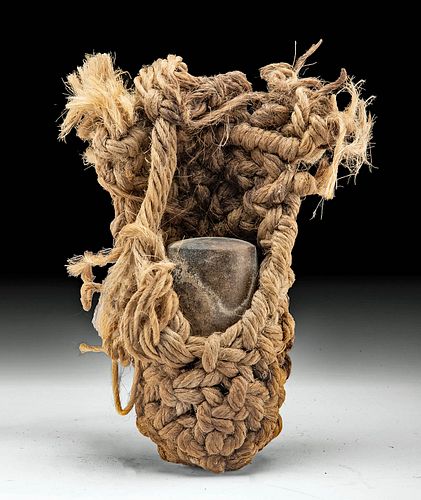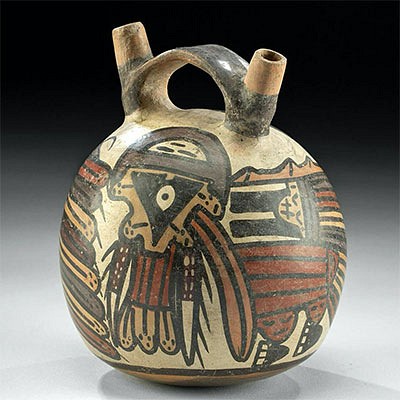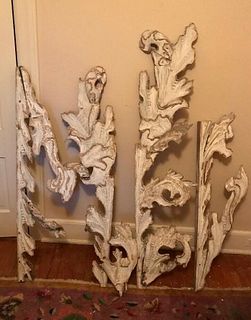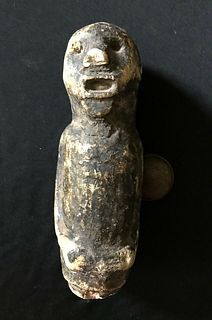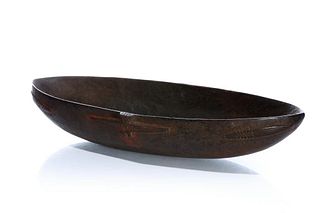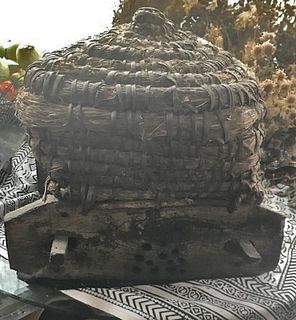12th C. Native American Hohokam Fiber Bag w/ Stone Idol
Lot 101b
About Seller
Artemis Gallery
686 S Taylor Ave, Ste 106
Louisville, CO 80027
United States
Selling antiquities, ancient and ethnographic art online since 1993, Artemis Gallery specializes in Classical Antiquities (Egyptian, Greek, Roman, Near Eastern), Asian, Pre-Columbian, African / Tribal / Oceanographic art. Our extensive inventory includes pottery, stone, metal, wood, glass and textil...Read more
Categories
Estimate:
$3,600 - $5,400
Absentee vs Live bid
Two ways to bid:
- Leave a max absentee bid and the platform will bid on your behalf up to your maximum bid during the live auction.
- Bid live during the auction and your bids will be submitted real-time to the auctioneer.
Bid Increments
| Price | Bid Increment |
|---|---|
| $0 | $25 |
| $300 | $50 |
| $1,000 | $100 |
| $2,000 | $250 |
| $5,000 | $500 |
| $10,000 | $1,000 |
| $20,000 | $2,500 |
| $50,000 | $5,000 |
| $100,000 | $10,000 |
| $200,000 | $20,000 |
About Auction
By Artemis Gallery
Feb 10, 2022
Set Reminder
2022-02-10 10:00:00
2022-02-10 10:00:00
America/New_York
Bidsquare
Bidsquare : Ancient & Ethnographic Art Through The Ages
https://www.bidsquare.com/auctions/artemis-gallery/ancient-ethnographic-art-through-the-ages-8873
Join us for Part Two of a spotlight on two fabulous collections, one from Lumberton, Texas, and the other from Whisnant Gallery in New Orleans. Artemis Gallery info@artemisgallery.com
Join us for Part Two of a spotlight on two fabulous collections, one from Lumberton, Texas, and the other from Whisnant Gallery in New Orleans. Artemis Gallery info@artemisgallery.com
- Lot Description
Native American, Southwestern United States, Arizona, Salt River Valley area, Hohokam people, ca. 12th to 14th century CE. A fiber pouch woven from thick vegetal ropes to contain the included stone fetish or idol carving. The stone is pecked and polished into a cylindrical shape and may have been used as an idol or a pestle like tool; however, the stone is relatively lightweight and might not be ideal for pounding. The pouch is shaped with a low opening lip, so the top of the stone is visible and easily accessible when stored. The Hohokam built a complex irrigation canal system for agriculture and cultivation which enabled permanent settlements in their arid environment. Size of stone: 4.125" L x 2" W (10.5 cm x 5.1 cm); pouch: 9" L x 5" W (22.9 cm x 12.7 cm)
This piece has been searched against the Art Loss Register database and has been cleared. The Art Loss Register maintains the world's largest database of stolen art, collectibles, and antiques.
Provenance: private Glorieta, New Mexico, USA collection
All items legal to buy/sell under U.S. Statute covering cultural patrimony Code 2600, CHAPTER 14, and are guaranteed to be as described or your money back.
A Certificate of Authenticity will accompany all winning bids.
PLEASE NOTE: Due to recent increases of shipments being seized by Australian & German customs (even for items with pre-UNESCO provenance), we will no longer ship most antiquities and ancient Chinese art to Australia & Germany. For categories of items that are acceptable to ship to Australia or Germany, please contact us directly or work with your local customs brokerage firm.
Display stands not described as included/custom in the item description are for photography purposes only and will not be included with the item upon shipping.
#149326Fraying and unraveling of fiber cords. Light mineral and earthen encrustations. Active shedding of fibers. Surface abrasions and chips to stone but otherwise intact.Condition
- Shipping Info
-
All shipping is handled in-house for your convenience. Your invoice from Artemis Gallery will include shipping calculation instructions. If in doubt, please inquire BEFORE bidding for estimated shipping costs for individual items.
-
- Buyer's Premium



 EUR
EUR CAD
CAD AUD
AUD GBP
GBP MXN
MXN HKD
HKD CNY
CNY MYR
MYR SEK
SEK SGD
SGD CHF
CHF THB
THB